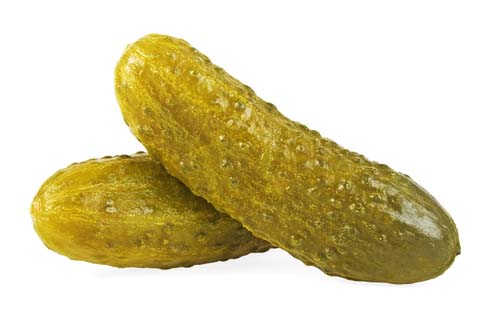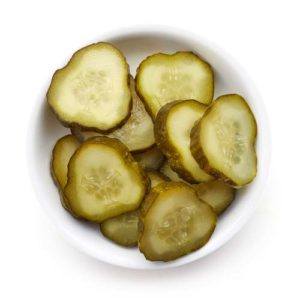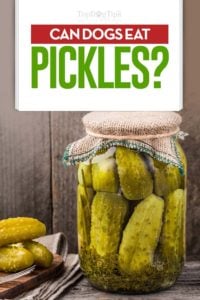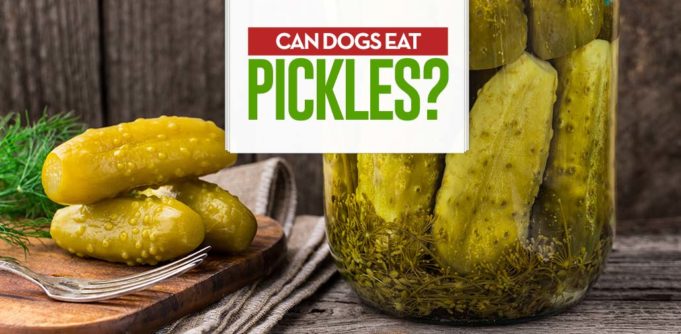Due to their popularity as a side dish, not many know that pickles are considered a health food. But can dogs eat pickles the way humans can, and are pickles safe for dogs to consume? What are the health benefits of pickles for dogs and are there any side effects? Let's take an extensive look.
If you've been wondering, “can I give my dog pickles,” the answer is – it depends. Pickles (or pickled cucumbers) are not toxic to dogs, but they are also not the safest treat.
Generally, pickles are not overtly harmful to dogs, but they aren’t necessary for dogs to eat either. And while they may have some health benefits, there's more to giving pickles for dogs that every pet owner should be aware of.
RECOMMENDED: Can Dogs Eat Cucumbers?
What are pickles?
Pickles are vegetables that have been preserved in salt water brine or acidic liquids for long-term preservation from spoilage.
The term “pickles” can refer to several different vegetables that have been pickled. However, the most common vegetable associated with pickling is the cucumber, which is often pickled in dill brine, garlic, and spices.
As such, most people refer to “pickled cucumber” when mentioning pickles. That's what we're going to cover in this article on benefits and side effects of pickles for dogs.
This is what pickles (or, pickled cucumber) looks like:

This wonder food dates back 2030 B.C. where the first travelers discovered pickling cucumbers with just two ingredients: salt and water.
Pickles for Dogs 101
Can Dogs Eat Pickles?
Pickles are not toxic to dogs. However, they are not a recommended treat for your canine, and there are a few reasons why.
That said, pickles do have some healthy nutritional benefits to them. They are a great source of several vitamins and minerals:
- Vitamin A
- Vitamin K
- Potassium
- Magnesium
- Calcium
- Iron
- Fiber
In theory, these vitamins and minerals would make giving pickles to dogs a great treat. So let's explore some of the potential benefits of pickles for dogs first.
6 Potential Health Benefits of Pickles for Dogs
 1. Vitamins A and K.
1. Vitamins A and K.
Vitamin A promotes eye health in dogs, while Vitamin K helps to regulate normal blood functions and strengthen bones in the dog's body.
2. Potassium.
Potassium is an important electrolyte mineral that helps maintain heart function, digestive health and general well-being in dogs.
3. Magnesium.
Magnesium is another vital mineral needed for proper heart function, bone health, absorption of calcium, and regulation of the nervous system in a canine body.
4. Calcium.
Just like for humans, calcium is also essential for dogs to strengthen bones and teeth, as well as to keep dog’s coat and nails healthy as well. This mineral also promotes nerve function, digestion, hormone release, and healthy heart function in canines.
5. Iron.
For dogs, iron combined with protein consumption creates hemoglobin, which carries oxygen through red blood cells in the canine body. It is also needed to help certain enzymes function correctly within dogs.
6. Fiber.
Fiber regulates the digestive system in dogs, which in turn makes for a stronger immune system. It can prevent fat gain, constipation, and bloat in canines.

“So can I give my dog pickles then?”
Technically, you can, but do not rush into turning your dog's meal into a pickle-fest.
In theory, this looks good. However, once the cucumber has been “pickled,” the vegetable actually loses a lot of it (although not all) of its nutrients. In order to provide your dog with most of these nutrients, it's always better to give non-pickled cucumbers instead.
Why aren’t pickles a good snack for dogs? Because they may contain other ingredients that will be toxic or unhealthy for dogs to eat. Let’s take a closer look.
ALSO READ: Can Dogs Eat Potatoes?
More on Pickles for Dogs
4 Important Safety Precautions
Pickles may not be toxic to dogs, but that doesn’t mean they are completely safe.
Because of the pickling process as shown in studies, and the food items included in pickling, brined cucumbers can become a detriment to your dog’s health.
Here are the reasons why:
1. Pickles contain high quantities of sodium.
Pickles are extremely salty, as they are preserved in a sour brine that consists almost entirely of salt. Salt does not add anything beneficial to your dog’s diet.
In fact, salt (or sodium) promotes dehydration and excessive thirst in dogs just as it does in humans, which can lead to frequent urination.
High blood pressure can also result from feeding your dog too many pickles, so if you must give your dog pickles as a treat, feed them in a very controlled amount.
2. Excessive salt can cause pancreatitis.
There are more issues associated with pickles and salt for dogs.
Dogs who regularly eat food that is high in sodium, like pickles, can develop pancreatitis, which is an inflammation of the canine pancreas. The pancreas becomes incapable of functioning properly and breaking down sodium and fats.
This condition is very painful for a dog. The stomach becomes sore and tender, and the dog may walk in a hunched fashion or refuse to move altogether. Vomiting may occur if the dog attempts to eat.
Canine pancreatitis is very common, and oftentimes it's a result of poor dietary choices.
A dog with pancreatitis needs to be hospitalized and given IV fluids, pain medications, and antibiotics to treat the condition. Quick treatment of canine pancreatitis generally leads to a full recovery, although the dog will need to avoid sodium-rich foods in its diet to prevent a reoccurrence of the illness.
3. Pickles may contain spices that are off-limits for dogs.
Today's pickling process has “improved” and contains more than the three ingredients. It may often include garlic, white vinegar, and onions, all of which should not be in your dog’s food because they are toxic to dogs.
- Garlic is toxic to dogs. It causes vomiting, panting, high heart rate, blood in urine, and weakness in canines when eaten even in small amounts.
- White vinegar can cause gastrointestinal upset in dogs, including diarrhea, gas, and vomiting.
- Onions are toxic to dogs and can result in a condition known as hemolytic anemia. The red blood cells are damaged by the onion toxicity and burst. If the condition is very advanced, the dog will require hospitalization and blood transfusions.
Obviously, look at the ingredients list before choosing pickles for dogs. Ideally, it's best to avoid them altogether, but if you must, always choose pickles that do not have anything else in them other than the main three ingredients.
4. Even if unaccompanied by spices, pickles can cause digestive upset.
Spices are not the only reason why feeding pickles to dogs may cause stomach upset.
The more you feed your dog pickles, the more likely they will be to cause gastrointestinal upset in dogs, including diarrhea, constipation, and stomach discomfort.
Ultimately, it's not worth the risk of giving pickles to dogs.
Are there any actual side effects of giving pickles for dogs?
No – pickles themselves do not have any side effects in dogs other than the precautions noted above, unless they are fed in excess to a dog. However, it's always better to give your dog fresh cucumbers instead and avoid pickles altogether.
Summary:
Can I Give Pickles to Dogs?
 Technically, you can give pickles to dogs if they do not contain any additional ingredients.
Technically, you can give pickles to dogs if they do not contain any additional ingredients.
However, it's not recommended and it's better to opt for cucumbers instead.
While pickles alone are not toxic to dogs, what they are pickled in can be dangerous. High levels of sodium and ingredients like onions, vinegar, and garlic, which are often used in pickling, can have disastrous impacts on your dog’s health.
Better alternatives exist if you want to give your dog a healthy snack.
READ NEXT: 11 Best Superfoods for Dogs That May Improve Their Health













